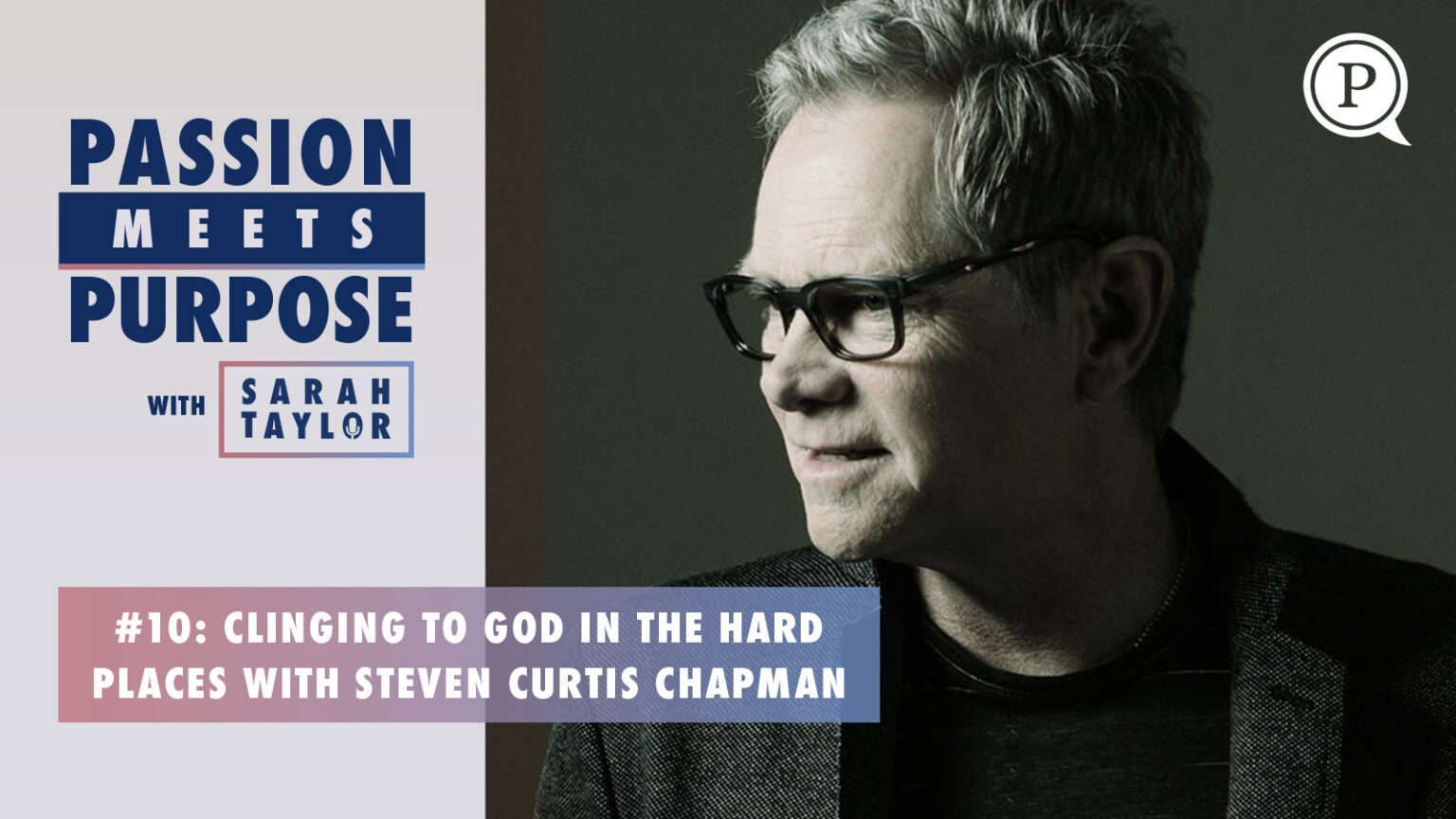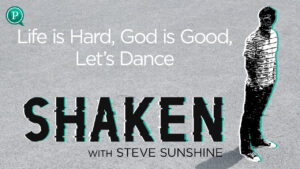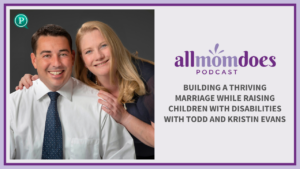It’s the one and only Steven Curtis Chapman joining us today on the Passion Meets Purpose Podcast. Sarah asks him about his book “Between Heaven & the Real World,” the band his son is in, and walking through the dark parts of life while clinging to God. Don’t miss this, if you are in need of the reminder that God reveals himself in unexpected places!
Interview Links:
- Follow Steven Curtis Chapman Online | Facebook | Instagram | Twitter
- Buy Steven Curtis Chapman’s book “Between Heaven & The Real World“
- Colony House
Transcription:
Steven Curtis Chapman: Somewhere along the way, and the tour, you know, the word will get out. Somebody will say, man, somebody said your dad’s in the music business or did something in the business. You know, what’s, what’s that? Who is he? And they’ll usually, you know, very kind of humbly say, oh, well you may never have heard of him because you know, he’s in the Christian music world and, and, uh, his name’s Steven Curtis Chapman.
And they’ve had like several occasions where these people go, are you kidding me, Steven? And use, sometimes they throw an expletive in there you know, it’s like Steven bleeping, Curtis Chapman… Like we grew up on his music. Of course we know who that is, you know, are you kidding? You know? And the guys just laugh because they’re like, dad, we never heard your name with that word inserted in there. It’s pretty interesting, you know. But these people that are just, you know, these rock, you know, rock bands and alternative bands are like, man, we totally know his music and that’s your dad. No way. That’s been pretty. It’s been pretty crazy. Yeah. And then that opens these amazing doors for them that ended up having pretty incredible conversations with a lot of these bands they toured with, you know, and find out guys who grew up around the church and, you know, got disillusioned and somewhere on the journey and just, it’s been really amazing. Even that the ministry of that it’s been pretty incredible.
Sarah Taylor: If you’ve been listening to Christian music anytime over the decades then you recognize that voice is the one and only Steven Curtis Chapman.
My name is Sarah. Welcome to the Passion Meets Purpose podcast and you are in for such a treat. I’m not sure if you’ve read Steven’s book that came out a number of years ago, it’s called Between Heaven And The Real World, and it is fantastic. It’s one of the ones I have. Purchased on Amazon and sent to friends and family, even if they’re not readers, like there’s just something about this book. I read it in a weekend and it kept me up at night because I just kept going chapter by chapter. We’re going to start out by talking about the book. We’re also going to talk about his sons and their band, him the house. It’s funny how you can hear his voice just light up when he talks about his boys, you could ask Steven about his music all the time, but you bring up his boys and he goes into the stratosphere with pride, and rightfully so. Here’s our conversation with Stephen Curtis Chapman.
I have got your book in front of me and I have to say, I laughed out loud when it arrived at my house in the envelope, because it was a lot bigger than I thought it would be. And then I thought, well, of course, it’s this thick.
Steven Curtis Chapman: Of course it’s Steven Curtis Chapman … how could it not be a lot of words? That’s funny. Yeah, I see. Yeah, it was kind of, I know our goal was around I think 80 to 90,000, 80,000 words, I think was the goal that the publisher gave me and we came in with 140,000. Um, and so we had to, and then began shaving it back and back. And I was like, well, you can’t leave that out. We got to, I can’t have that story gone, you know? And so finally we got them down to about a hundred thousand words. They said, okay, we’re gonna let, we’re gonna, we believe we agree. It all needs to be in here, but yeah, it was a challenge.
Sarah Taylor: Let’s jump into some, a few of my favorite parts and you know what, I’m just going to go for. I’m going to go for the one that caused my jaw to drop. It’s basically for anyone that’s read Mary Beth’s book Choosing To See, and they understand how important that word is to your family. I’m not going to give away the end of the book. I’m just going to say, what would you, what would you like to talk about with that final closing chapter and how God orchestrated something that is remarkable. It’s going to cause people’s jaws to drop. What can you say about that?
Steven Curtis Chapman: Yeah, well, um, I’m thinking you’re probably referencing particularly a certain picture photo that we included in the book and, um, you know, the whole of the story, I think for me, what I knew about myself, but what I learned much deeper about not just myself, but just life and my story and my journey, but all of our story at all of our journey is as I talk a lot in the book, my desire and drive to fix what’s broken and being the fixer and, and everywhere I encounter, uh, you know, brokenness and unfixable things, how that has frustrated me, and yet how over and over again, those have been the places in my journey where God has revealed the most profound things about himself and where I’ve learned the most about who he is. And so all the way through the journey, and obviously the ultimate unfixable in my story is our loss of our little girl, Maria. And, um, and yet even in that, seeing how God reveals himself in ways that are unbelievable. I mean, there’s no other explanation as you’re referring to specifically, when I get to kind of talk about and share towards the end of the book as our family has journeyed through the darkest part of the valley. Um, not that we’ve come out the other side and saw behind us because there’s still plenty of days that were, it’s just as dark and heavy on our hearts, but watching God show up and letting us see, uh, there’s that word again, um, see him reveal himself in some really unbelievable, uh, ways that you can’t explain any other way, but say, yeah, that that’s God. That has to be God showing himself to us say, trust me, okay. I’m with you. I’m for you. And he’s done that over and over again, my journey and that’s why I’m so thankful I got a chance to tell the story. In great detail in the book.
Sarah Taylor: So, so good. You had mentioned after Maria’s passing that you started reading every book on heaven that you could find. You wanted to become a student of heaven because you had a daughter living there now. Would you share a little bit about what you discovered and how it may be changed your view?
Steven Curtis Chapman: Well, yeah, I mean, I think even the, the title was one as I thought about what to call the book, there was one point when I really was kind of fighting for the title Unfixable because it felt like so much of that theme of, you know, when I encounter those unfixable things in my life and in my marriage and can’t fix what’s broken and the frustration of that, and yet how God is over and over again, shown up in those ways.
I really kept coming back to this idea of a little bit using the song that I wrote years ago, Heaven in the Real World. The music that I’ve written and, you know, it’s all been inspired from the places where God has shown up having is kind of, kind of made a, an appearance in a very real world, uh, and trying to write songs about that, not just escaping the real world into these heavenly notions and ideas. Kind of the old, you know, so heavenly minded of nowhere, if we good and all of that, but to be you know, very heavenly minded, but still have great earthly good cause you know, you’re bringing it into the real world, uh, that, that we all live in. And that’s what I’ve hoped and I wanted to do with my music for all these years that phrase, and really heaven truly, you know, not just heavenly ideas or heavenly notions, but the place. Heaven became so much more important to me and so much more real when my little girl went to be there. And I get to share again in great detail of what I really believe is the closest I have come to standing at the door, or, or I did stand at the door of eternity at the hospital um, as we walked in and, and spent a few moments, uh, with Maria’s, uh, shell, as we called it, because we knew that she was not there, but that she’d gone to be with Jesus. But it was such a tangible moment of standing at the door of heaven and could see just, just inside.
But our, I really couldn’t see anything except just the door cracked and just had sense, and again, I’ll say, see, I was seeing in my, kind of my mind’s eye and just in kind of the holy spirit, give me just this understanding that I am standing here. This is it. This is, there’s no question for my little girls on the other, your side of that door. And I want everything in me and my wife, and I want to run through that door and go be there. But thank you God, that I can be really know and believe fully, this is real. But I wanted so much to see inside. And I think yes, at that point, you know, I began to think, um, I want to know about it. I want to read books about it.
But what I began also to realize is, you know, we’re still, we’re still looking through this very dark glass and even our best ideas, uh, are still going to be so fuzzy and hazy and out of focus of what really is there. And yet it’s real. And I think that’s the part that I really found the greatest comfort in is God, I’m going to have to trust you with what I don’t know about what heaven is. Cause I can read all the books in the world and they’re all going to tell, you know, a different story. Um, and there’s a reason why even in the revelation and, you know, the men, the Bible, it’s these images that we can’t even really kind of put together in our brains, uh, because we’re, it’s like we’re trying to scoop up the whole ocean in a Dixie cup, you know, and kind of go, oh yeah, I can, I can put the ocean in that. We can’t put all of that into our, you know, very finite brains. There’s an infinite, um, goodness and beauty, but you know what I have come completely to believe in though, is that ultimately, that is, it is real. And, and we’re on this journey. And as a, you know, title, the book is, is living sort of in this place between these two, between this very real world of brokenness and, and yet longing for and believing on the art that heaven, uh, yeah, is real. And, um, that, you know, there is a place that every tear is going to be wiped from our eyes and everything is going to be made right. And all of the sad things are gonna come untrue and believing that as what is, uh, us and has given my family and me the strength to take each step as it comes. In each breath as it comes. And, uh, and keep journeying forward.
Sarah Taylor: One of the tangible representations you have of that is the fact that you did a remodel on your house and the driveway goes a different direction now, if I’m not mistaken, which means that your studio has a purposeful location, as well as your grand piano. Will you share a little more about that?
Steven Curtis Chapman: Yeah. When we were in the process of kind of re-building the house and that was a long again, I have not really shared about that um, outside of finally getting to go into detail in the book, because it’s such a crazy kind of thing to, to think that was what we should do. You know, we, we wrestled with whether we would sell our house, you know, could we go back and live at the house where, you know, we, this tragic accident happened and took place in our driveway. And would that always just be, you know, this looming, dark, you know, reality for coming home and being in that home. But we were there for a little while and, and felt like, no, I think, you know, I think we need to stay here. It feels like holy ground. I mean, this is a very sacred place and it’s where our daughter went to be with Jesus.
It’s where our oldest daughter got married and began a new chapter of her story, and only a few months after Maria went to heaven. Where we raised our kids and you know, so many memories and I feel like my wife said it best, she said, I don’t think I can leave here, but I don’t think I can live here. So what do we do? And became very stuck. And, and so after much prayer and really wrestling through your process for me, because I just couldn’t come to peace with the idea of what my wife said. She was feeling like she needed to do, wanted to do for just the healing process would be to actually rebuild a house there on the very same spot, but just be able to change much about the way it was laid out in the driveway and where the accident took place. And just all the memories that began… I began to realize that these are a part of, that will always be a part of us when we walk in this door and, and, uh, drive up this driveway this way. So in the process of, of that, right where the driveway came and where the accident took place, it was obviously important that we re kind of structured all of that. And, uh, I really didn’t even realize it until after, you know, we had done the rebuilding and the restructuring with an architect, kind of changing things around that, the actually where the accident took place, um, what sits in that spot now is, uh, is the recording studio. I was able to build just beside the house connected by a breezeway, a little recording studio, home studio that I use, uh, to, to make my music. And basically right in the, kinda the heart of the studio, right about where my piano sits, where I’ve written some of the songs since that tragedy, just declaring we’re trusting God’s faithfulness and God’s goodness. And sat actually with Matt Maher and wrote a song called Hallelujah You Are Good, with tears streaming down our faces um, as I shared the story in detail with him and wrote that song, just declaring that God is good, even when life is so hard. Um, it was really sitting in pretty much that same spot where Maria met Jesus. So, you know, things like that, it really, again, that we didn’t even plan for it, but we are able to see God orchestrating little reminders of his, his faithfulness and his goodness to us, even on this journey it’s been very difficult.
Sarah Taylor: We’ll be right back with our conversation, but first a heartfelt thank you to our sponsor Northwest University. Have you heard NU is all in on tech. They’ve got a brand new state-of-the-art technology studio and majors include UX design, data science, video production, audio production, and computer science.
These programs add to an already diverse offering of top programs in business nursing education sciences is communication, psychology, music, humanities, and more. Plus NU has robust scholarships. This is on top of their already low tuition. Ministry majors in the traditional undergrad program receive a 50% scholarship.
Northwest University’s Christ centered community always stands out. Spiritual vitality is their firm foundation. And with Northwest’s career readiness initiative, you’ll graduate with endorsements in career specific skills that give context to your resume. When you choose NU you’re choosing a confidence, start to your calling.
In other words, your passion and purpose. Now back to this week’s episode.
Sarah Taylor: And another big part of the story is your son Will. And I know that any father would want to brag on his children. And I want to talk a little bit about Colony House.
Steven Curtis Chapman: Yes, we can talk about Colony House all day. I’m all good with that.
Sarah Taylor: I can tell him the sound of your voice, like when we bring it up and just how proud you are of Caleb and Will Franklin. And, um, for anyone that doesn’t know, why don’t you describe a little bit about, uh, the kind of music Colony House does. I want you to talk about how you had, I think it was Mary Beth posted an Instagram picture of the bracelet you were wearing behind the scenes. I think it was maybe at the Conan show, which is just so cute because it’s like, it’s gotta be great to go to a late night talk show host, and you’re not there as Steven Curtis Chapman, you’re a dad with a bracelet cheering on your sons.
Steven Curtis Chapman: Absolutely. Well, I am so, so proud of my boys and just so thankful for the, not only the musicians. I mean, I say I’m proud and I’m incredibly proud of their music, and an amazing record called only the lonely and, you know, Television performances on today’s show, and Conan O’Brien and late night with Seth Meyers, James Corden’s show… um, and you know, just, just killing it. I mean, they’re doing so great, but what I’m most proud of, um, and it really is kind of captured in this little moment that, that their record was released and they were over at my house and it was late at night because the record got released, like around midnight on iTunes and immediately shot up to like number three on the overall charts. Not just, you know, in the specific genre, which would be considered alternative, but overall charts, the record was number three. And they knew, you know, that’s not going to last there forever. It’s not like it’s going to be a, you know, a number one record. But, but that was so exciting for them cause this is only their second album and they’re still very new band and people are still discovering them, but Caleb and Will, Caleb is a guitar player, Will is the drummer and they toured with me for about five years.
So some people saw them on tour with me. They’re just amazing musicians and have been since they were teenagers. And, uh, but they after all of this, um, excitement and, you know, checking up, you know, updating and refreshing the phone every five seconds to see, you know, what was going on and how excited people were about the new record, they were getting ready to go home about I don’t know, 1:30 in the morning and Caleb, without me prompting this, my son Caleb said, well, Hey, before we go, why don’t we pray together and Caleb just proceeded to pray this amazing prayer and just said, God, we, we know that this is a gift and that this is your favor on us. And we really want to honor you with it and you’ve given us a story and, um, and we want to tell that story well, and we want to do it in a way that’s that honors you. In a way that’s, uh, you know, respectful and reflects you.
And I mean, just, it was everything that I would have hoped, you know, all those years praying for them and hoping they’re watching, because we know all know that a lot more is caught than taught. And even though I tried to teach them some things I’m hoping for catching some good things and not just all the bad things. And, you know, I see them respond that way, that’s pretty amazing and pretty encouraging. So yeah, I’m so excited for them and proud of them, and check them out. If you don’t know Colony House music, you got to listen to it. It’s amazing.
Sarah Taylor: Have you gotten to a place yet where someone might see you and the name Steven Curtis Chapman doesn’t mean anything to them, but if they hear that you’re the dad of the boys in colony house, they think that’s pretty cool?
Steven Curtis Chapman: Oh yeah, have had people, you know, when I go to their concerts and different things where people be like, you know, Yeah. Yeah. This is our dad. Oh man. Love your son. Amazing music, amazing band. You know, they don’t have any idea, you know, who I am because the world that my boys are in, you know, there’s a mainstream music world where, you know, it’s really been fun on both ends of it because there are a lot of guys, you know, in that world that never heard of me.
And then it’s really also for them, a lot of fun when they go into a lot of places and I’ve had several encounters with people that tour tours that they’ve been on with other artists that are, you know, mainstream artists and they won’t say anything, and, and you know about, you know, who their dad is or any of that.
They’re just doing their thing and showing up and, and playing great music. And, and somewhere along the way, and the tour, you know, the word will get out. Somebody will say, man, somebody said your dad’s in the music business or did something in the business, you know, what’s, what’s that who he? And they’ll usually, you know, very kind of humbly say, oh, well, you may never have heard of him because you know, he’s in the Christian music world and, and, uh, his name’s Steven Curtis Chapman.
And they’ve had like several occasions where these people are like, you kidding me, Steven? And use, sometimes they throw an expletive in there. You know, it’s like Steven bleeping, Curtis Chapman, like we grew up on his music. Of course we know who that is, you know, you kidding? You know, and the guys just laugh. Cause they’re like, dad, we never heard your name with that word inserted in there.
It’s pretty interesting, you know. But these people that are just, you know, these rock, you know, rock bands and alternative bands, Man, we totally know his music because that’s your dad. No way. That’s been pretty, it’s been pretty crazy. And then that opens these amazing doors for them to end up having pretty incredible conversations with a lot of these bands they’ve toured with, you know, and find out that they’re guys who grew up around the church and, you know, got disillusioned in somewhere on the journey and just, it’s been really amazing. Even that the ministry of that it’s been pretty incredible.
Sarah Taylor: You talk a lot about your courtship of Mary Beth and your, your relationship in the book and I would say that the quickest way to encapsulate that is that you have a personality like Tigger and she has a personality like, Eeyore, and for, for marriages that find themselves in a similar situation. Can you let me know a story that comes to mind as to when that actually plays out to your advantage that it works out well?
Steven Curtis Chapman: Well, that’s the thing, you know, that’s crazy. Um, I mean, it, it is crazy. And it will make you crazy. It makes my wife most crazy. I think, you know, Eeyore’s much more frustrated with Tigger and Tigger ever is with Eeyore. Um, you know, because you know, I’m like, Hey, come on. No, we can do this. This is good. Bouncy, bouncy, fun, fun, fun. And, you know, she’s just kind of like, would you please, you know, leave me, let me, uh, leave me alone. Um, but the, the beauty of it, you know, and yeah takes, you know, really embracing and, and seeing the beauty in it is that, you know, God does that because it’s such an beautiful way for us to, you know, fit together is to be, have those different looks at life, you know? Cause I need so much my wife, and it’s not that she’s like, uh, I mean I say Eeyore, but she’s more melancholy and she will definitely view things, you know, in, in more of that kind of a lens and I can be, you know, overly, oh, it’s all good. It’s all good. And so having each other, you know, as parents cause I, my tendency can be to go, you know, all I got this, it’s fine.
They’re all good. And her tendency left alone is, you know, well, doom and gloom. They’re not, you know, they’re not gonna, it’s not gonna work out. They’re not going to get this. Um, we need each other very much and I’ve seen that play out, and, you know, over and over and over again in so many ways. And, you know, I mean, even on the side of just being different, not necessarily scarily that Eeyore, Tigger thing, but just the differences of how God has brought us together and how much I have to learn in that process, you know? Um, so it’s just, yes, it’s been a beautiful, wonderful, challenging, frustrating, and amazing thing.
Sarah Taylor: Well, my final question kind of is a story that sort of encapsulates that a little bit. It’s just beautiful. It’s the moment you got Shaohannah and you describe it well, so I just want you to kind of give me a little picture and I’ll, I’ll set the scene for you. This is, you know, you’re on your adoption journey. You’re in China, your older kids are with you waiting in the hotel room. You get a phone call that the people that are bringing this baby to you are now in the elevator and Mary Beth is on the bed and she is nervous and you’re watching her face. Go ahead.
Steven Curtis Chapman: Yeah. Yeah. And she’s just kind of freaking out because this is the moment and leading up to this moment, you know, she’s been terrified and I get to really tell the journey of, you know, from a place of just saying, you know, adoption and another baby and all that. We’re, we’re way past that stage in our life. And then God does this incredible thing and, and changes her heart and puts us on this journey. And then we’re so excited. We can’t wait to meet Shaohie. Uh, and there are new little girl we’ve already got her name, uh, show Hannah, and we’re going to call her Shaohie and all the three older kids there that have cheered on and prayed and begged and pleaded, uh, this process up to this moment. And then the word comes, it’s like, it’s real, it’s happening. There’s getting ready in the next, you know, minute or two or five. There’s going to be a little helpless baby placed in the arms of my wife, and she’s going to be mom forever, you know, to this little one, and what’s that going to feel like, and, and am I going to love her enough? Am I going to love her the same that I do my, my other children? And what if I can’t do that? What if I could, you know, all the, all the fear and all the questions? And she kind of has this conversation with the kids, then they’re looking at their mother with this very confused look because it’s not making any sense and basically what she’s saying is if in a few minutes, when this happens, your mother kind of loses her mind and you never recognize her again, I’m just telling you now I love, you know, I always loved you, you know, it’s like, they’re going, what is mom trying to say? She’s like losing it here and she doesn’t even know what she’s saying. She’s just saying, I don’t know, what’s getting ready to happen. I don’t know what’s going to happen. And so we walked out into the hallway… And one of her big fears, and this is just my wife again, she will find something to worry and stress about, is what if somehow the picture we’ve been looking at isn’t the baby that they bring to us. What if it’s, what if it’s a different baby and I’ve fallen in love with this picture and I’ll know it’s not, and then what am I going to do? I’m going to freak out and it’s not going to, you know, and she looks in it’s the baby that we’ve been falling in love with, through the picture. And she’s holding a little book that Mary Beth had sent with pictures of us or she not holding it, but it’s, it’s in her kind of blanket wrapped up with her.
And so we know it’s her, we know she got the book that we sent and yeah, and she just begins to leap and just says, it’s her it’s really her. And holds her in her arms picks her up and any fear is immediately erased. I can see it in her eyes and she would later say it I looked at this little person and it was my daughter from the beginning of my life, from the beginning of time, there was no question. And then I loved her instantly. Um, and it was God whispering to her heart saying, that’s how I love you. And it was just this incredible transformation of her heart and hearing God speak to her about his love for her, and all of that it’s happening at one time. And it was so amazing and incredible, and we’re standing there and after I don’t know, five or 10 minutes of us just doting on and, you know, crying over our new daughter we hear little voices from the room, cause we’re out in the hallway and the doors open to our hotel room and the kids are all still sitting on the bed where they were told to stay, and you hear voices say, can we come meet our sister now? It’s like, oh, sorry. Yeah, there’s that. So, you know, it’s like, come on everybody. And then they come out and of course it’s a big, you know, blubber Fest with everybody, but it was,
Sarah Taylor: And then on the plane ride home, she says to you…
Steven Curtis Chapman: Well, she said, I mean, going over, it was like, this is it. This is all we can possibly ever do in the way of adopting one child. People will say, you know, you can adopt, you know, once you adopt one, you you’ll probably adopt again or two or three times. And she just said, Don’t get any weird ideas in your mind that this is like the first of several, cause it’s not going to happen. And yeah, we were on the flight home and she looked at me and said, I think Shaohie might need a sister.
Are you kidding me?
Sarah Taylor: Oh, Steven. Thank you so much for your time, my friend. Thank you.
Steven Curtis Chapman: You’re welcome. Sarah has always great to talk to you and appreciate what you do. Thanks for taking the time to read my book. That means so much, and it’s very, very special.
Sarah Taylor: I devoured it. My husband was like, do you want to take care of our kids or do the dishes or anything?
I’m like, no.
Steven Curtis Chapman: I’m good. I’m good. Thanks.
Sarah Taylor: The book is called Between Heaven And The Real World. And I have a feeling that once you read it for yourself, you’re going to be buying copies for friends and family as well. Just consider Christmas gifts, taking care of this year. Our thanks to Steven Curtis Chapman and of course, to Northwest University for sponsoring the Passion Meets Purpose podcast.
We release episodes every two weeks. So that’s when I’ll see you, then.








